-

新人教版高中英语必修3Unit 4 Space Exploration-Discovering Useful Structure教学设计
The theme of the section is “Describe space facts and efforts to explore space”. Infinitives are one of non-finite verbs, as the subjects, objects, predicative, attributes and adverbials. This unit is about space exploration, which is a significant scientific activity, so every scientific activity has strong planning. Therefore, using the infinitives to show its purpose, explanations or restrictions is the best choice.1. Learn the structure, functions and features of infinitives.2. Learn to summarize some rules about infinitives to show purpose and modify.3. Learn to use infinitives in oral and writing English. 1. Learn the structure, functions and features of infinitives.2. Learn to summarize some rules about infinitives to show purpose and modify.3. Learn to use use infinitives in oral and writing English.Step 1 Lead in---Pair workLook at the following sentences and focus on the italicized infinitives. In pairs, discuss their functions. 1. I trained for a long time to fly airplanes as a fighter pilot..(作目的状语)2. As we all know, an astronaut needs to be healthy and calm in order to work in space..(作目的状语)3. First of all, you must be intelligent enough to get a related college degree..(作目的状语)4. Some scientist were determined to help humans realise their dream to explore space..(作定语)5. On 12 April 1961, Yuri Gagarin became the first person in the world to go into space..(作定语)Summary:1. 不定式的结构:to+do原形。2. 分析上面的句子,我们知道在描述太空探索时,动词不定式不仅可以用来表目的,还可以用来作定语,表修饰。

新人教版高中英语必修3Unit 4 Space Exploration-Listening&Speaking&Talking教学设计二
The themes of this part are “Talk about how to become an astronaut” and “Talk about life in space”. As Neil Armstrong said “Mystery creates wonder and wonder is the basis of man’s desire to understand. Space is difficult for human to reach, therefore, humans are full of wonders about it. However, if wanting to achieve the dream of reaching the Moon, some of our human should work hard to be an astronaut at first. Part A(Talk about how to become an astronaut) is a radio interview in a radio studio, where the host asked the Chinese astronauts about his story how to become an astronaut. Yang Liwei told his dreamed to be an astronaut since childhood. Then he worked hard to get into college at 22. The next 10 years, he gradually became an experienced pilot. At the same time, to be an astronaut, he had to study hard English, science and astronomy and trained hard to keep in good physical and mental health and to practise using space equipment. Part B (Talk about life in space) is also an interview with the astronaut Brown, who is back on the earth. The host Max asked about his space life, such as his emotion about going back the earth, the eating, shower, brushing, hobbies and his work. Part A and Part B are interviews. So expressing curiosity about the guests’ past life is a communicative skill, which students should be guided to learn.1. Students can get detailed information about how Yang Liwei became an astronaut and Max’s space life.2. Students learn to proper listening strategy to get detailed information---listening for numbers and taking notes.3. Students can learn related sentences or phrases to express their curiosity like “ I wish to know...” “I’d love to know...”4. Students can learn more about the space and astronauts, even be interested in working hard to be an astronaut

新人教版高中英语必修3Unit 4 Space Exploration-Reading and Thinking教学设计二
The theme of this unit focuses on “space exploration.” Students will learn about the training and experience needed to become an astronaut. The text is mainly about the development of space exploration. On the one hand, the text helps students to have a good understanding about the great feats humans have achieved, on the other hand, they will further understand the contributions that we Chinese have achieved, and feel confident and proud about our homeland and strengthen their love for our country. The teacher should instruct students to aim high and study harder to make great progress in the space career if possible.1. Read about the development and value of space exploration.2. Explore the mysteries of the universe and the achievements in space exploration.3. Skillfully use the vocabulary of this text to cultivate self-study ability 4. Develop cooperative learning ability through discussion.1. Enable the Ss to talk about the development and value of space exploration.2. Guide the Ss to summarize the main idea of each paragraph as well as the main idea of the text.3. Help Ss comprehend the main reasons for space exploration. Multi-media, textbook, notebooks.Step 1: Warming up and predictionLook at the title and the pictures of the text and predict what the text will be about?2. What are the main reasons for space exploration?

新人教版高中英语必修3Unit 4 Space Exploration-Reading and Thinking教学设计一
Q4: What is the function of the International exploration ?Having astronauts from different countries on boardQ5: What can you learn from Para 4 ?China has made great achievements in exploring spaceQ6: What is the attitude to the space exploration ?SupportiveStep 6 Post reading---RetellPeople have always wanted to learn more about space. Before the mid-20th century, most people felt (1)_________ (travel) into space was an impossible dream. However, (2)____ the help of scientists, peoplesucceeded in realizing their dream (3) _________ (explore) space. On 4 October 1957, the Sputnik 1 satellite (4) ____________(launch) by the USSR. (5) ________________ scientists try to make sure nothing goes wrong, accidents can still happen. These disasters made everyone(6)___________(disappoint), but people still believe in the importance of (7) ________(carry) on space exploration. In 2003, China became the third country to (8)_____________ (independent) send humans into space. Then Shenzhou 6 and 7 completed (9)____ second manned orbit and the first Chinese spacewalk. In spite of the difficulties, scientists hope future (10)__________ (discovery) will not only enable us to understand the universe but also help us survive well into the future.Answers: 1. travelling 2. with 3. to explore 4. was launched 5. Although6. disappointed 7. carrying 8. independently 9. a 10. discoveriesStep 6 Post reading---Critical thinkingQ1: What do you think of the space exploration ? I think it is beneficial to us. Through further study of space, people will make full use of it in the future, such as the space experiments by Wang Yaping in Tian Gong 1.Q2: If you are determined to be an astronaut, what should you prepare at present ?First of all, I should study hard to get a related college degree. Besides, I must keep mental and physical healthy.Step 7. HomeworkTry to summarize the structure of the article by a mind map.

新人教版高中英语必修3Unit 4 Space Exploration-Reading for Writing教学设计二
⑦在我看来, 探索太空是值得的。As far as I am concerned, it is worthwhile to explore the space.Step 10 Writing---draftRecently, students in our class have had heated a discussion on whether space is worth exploring. Students hold different ideas about it.30% of us think space exploration is not worthwhile. They think space is too far away from us and our daily life and is a waste of money. And the money spent on space exploration can be used to solve the earth’s problems such as starvation and pollution.On the other hand,70% think space is worth exploring because we have benefited a lot from it,such as using satellites for communication and weather forecast. What’s more,with further space research,we may solve the population problem by moving to other planets one day. Also,space research will enable us to find new sources to solve the problem of energy shortages on the earth.As far as I am concerned, it is worthwhile to explore the space. Not only can it promote the development of society but also enrich our life. Step 11 Pair workExchange drafts with a partner. Use this checklist to help your partner revise his/her draft.1.Does the writer explain why he/she changed/wanted to change?2.Does the writer tell how the changes have improved or will improve his/her life?3.Is the text well-organised?4.Does the writer use words and expressions to show similarities and differences?5.Are there any grammar or spelling errors?6.Does the writer use correct punctuation?

新人教版高中英语必修3Unit 5 The Value of Money- Discovering Useful Structure教学设计
Step 3 Meaning1. 过去将来时表示从过去某一时间来看将要发生的动作或存在的状态, 常用在宾语从句中。一般由“would/should +动词原形”构成。She hoped that they would meet again someday. 她希望将来有一天他们能再见面。2. was/were going to+动词原形: 表示过去将要发生或很有可能发生的动作, 常用于口语中, 表示预言、意图或者打算等。He was going to start work the following week. 他打算下星期开始工作。3. was/were about to do: 常用来表示即将发生的动作, “刚要/正要做……”。注意该结构不与任何时间状语连用。I felt that something terrible was about to happen. 我感到某种可怕的事情即将发生。4.was/were to do: 表示“曾计划做某事”, 如果表示“本来计划做某事, 动作没实现”, 则需用 “was/were to have done”。She said she was to have told me about the accident. 她说她本来想告诉我关于事故的事。5.Start, go, come, leave, see, meet等动词的过去进行时: 表示就过去某一时刻而言即将发生的动作。She was coming later. 她随后就来。I had just put on my overcoat and was leaving to visit a friend of mine. 我刚穿上外套要去看我的一个朋友。

新人教版高中英语必修3Unit 5 The Value of Money-Listening &Speaking&Talking教学设计
4. A:We’d like to have someone to say a word at the beginning to welcome the group.B:↙Who?A:We thought that you or Dr.Johnson might do it.B用降调说Who,其意思是问,对方想让谁在开场时致欢迎词。Step 6 Pronunciation---Practice1. Listen to the short conversation and mark the intonation with ↗, ↙ or ↙, ↗. Then discuss with a partner what they intend to convey by using different intonation.Owner: You know what ?↗ It’s a million-pound bank note↙.Waiter 1: Really ?↗(question)Waiter 2: Really !↙(unbelievable and surprised)Waiter 3: Really ?!↙↗(first question then surprised)2. Listen to the conversations. Underline the parts that are stressed and mark the intonation. Then talk about the implied meanings of the responses with different intonations. Listen again and repeat.1) Henry: It’s a nice suit.Owner: Oh, it’s perfect!↙(The intonation means it is very suitable for Henry.)2) Henry: Well, that’s very kind of you.Owner: Kind, sir ?↗(what you said is not right) No, it’s kind of you. You must come whenever you want and have whatever you like. Just having you sit here is a great honour !!↙(welcome you to come again)3)Henry:Well, to be honest, I have none. Oliver:(happily) What luck!(excited) Brother↗, what luck!↙(It means “Didn’t you hear it?”)Henry: Well, it may seem lucky to you but not to me!↗(angry) If this is your idea of some kind of joke, I don’t think it’s very funny. Now if you’ll excuse me, I ought to be on my way.↙(If so, I would leave.)Roderick: Please don’t go↙...(hope Henry can wait for a moment)Part B Viewing and Talking---Describe people’s changing attitudes in a film clipStep 1 Before-listening---Tell the filmYou are going to watch part of the film The Million Pound Bank Note. Look at these photos and guess what happens in the film.

新人教版高中英语必修3Unit 5 The Value of Money-Listening &Speaking教学设计
Step 4: Listen again and decide if the following statements are true (T) or false (F).1 It was the first time Chen Liyan's story was reported. T口 F口2 Chen found 10,000 yuan in a small plastic bag in Taiyuan railway station口 F口3 Wang Zheng apologized to Chen because he couldn't offer her more money. T口 F口4 Chen took out a large loan to cure her daughter, T口 F口5 Wang set up a fundraising website for Chen's daughter after Chen told him about her situation. T口 F口Step 5:After listening, discuss the questions.1 What kind of person do you think Chen Liyan is?Chen Liyan is generous and honest because she returned a large sum of money to the owner.2 Did Chen return the money because she didn't need it?No. She returned the money because it was the right thing to do. Evidence for this is that she refused to accept the reward money because she felt that it had not been earned. 3 Is it common for people to do what Chen did?It depends on the culture. In some countries it is quite common to return money that has been found. In other countries, people believe "Finders are keepers!" 4 How did Wang Zheng feel about the return of his money?He must have been very happy and relieved to have gotten his money back. We know this because he thanked Chen repeatedly and even offered her a reward.5 Why did Ma Dongbao tell Wang about Chen's family?He must have had great sympathy for Chen and her daughter and wanted to help them.'We know this because he arranged help for them. 6 How did the news reporter feel about Chen's actions?The news reporter felt that it showed that money wasn't the most important thing in life. We know this because the reporter told us that this is what Chen believes. and then said, “that's a great attitude to take."

新人教版高中英语必修3Unit 5 The Value of Money-Reading and Thinking教学设计一
Everybody wants to get wealth.In today’s material world,making money or becoming wealthy symbolizes a person’s success and capability. Many people just make every effort, pay any price to attain greater wealth. With money,they can buy nice, large apartments in nice neighborhood. With money they can own luxurious cars. Wealth seems to bring all happiness in life.But is wealth the only road to happiness? Not really. There are many things in the world, which are beyond the means of money, such as friendship, love, health and knowledge. People are so preoccupied with struggling for money that they have no time or would not take the time to form or maintain friendship. What happiness can they feel living as lonely miserable creatures without love or friends in the world even if they accumulate tremendous wealth?In my opinion, people can’t do anything without money, but money is not everything. What money will bring you depends on your personal belief and goal in life. If you are kind enough to help others, especially the poor, money is a good thing to you. With it, you can do much more for the benefit of people and your country, and it will add to your own happiness. If you want money just for your own needs, you’ll never be satisfied or happy. In a word,you should have money spent for more people. Only then can money be the source of your happiness.Step 8 Homework4 students in a group, one acts Roderick, one Oliver, one servant and the fourth one acts Henry Adams, then listen to the tape, pay more attention to the difference between American English and British English in pronunciation, stress, tone.

新人教版高中英语必修3Unit 5 The Value of Money-Reading for Writing教学设计二
2. 您能看到, 我头发太长了。You can see that my hair is much too long.3. 无论什么时候, 只要您想回来就回来。Please come back whenever you want.4. 您仅有很少的头发要理! You only have too little hair to cut !5. 为您服务是我的荣幸!It is my honour to serve you!Step 9 Writing(Henry is walking down the street when he sees a sign for a place that cuts hair. He decides to have it cut. )H=Henry B=BarberH: Good afternoon, I’d like to have my hair cut, if I may. (The barber looks at Henry’s hair and continues cutting another man’s hair. ) Er, I’d really like a haircut. As you can see it’s much too long. B: (in a rude manner) Yes, I can see that. Indeed, I can. H: Fine, well, I’ll have a seat then. (He sits in one of the barber’s chairs. The barber turns to look at Henry. )B: It’s quite expensive here, you know! Are you sure you can afford it?H: Yes. I think so. (After his hair is cut, the barber tells Henry how much he must pay. Henry shows the barber the bank note. )B: Why Mr. . . (looks shocked)H: Adams. Henry Adams. I’m sorry. I don’t have any change. B: Please don’t worry! (wearing a big smile) Nothing to worry about! Nothing at all! Please come back whenever you want, even if you only have too little hair to cut! It will be my honour to serve you!Step 10 Pair workExchange drafts with a partner. Use this checklist to help your partner revise his/her draft.1. Are all the elements of a play included and in good order ?2. Do the character use suitable language ?3. Are the stage directions clear and useful ?4. Is the plot clear and exciting enough ?

新人教版高中英语必修3Unit 5 the value of money-Reading For Writing教学设计一
【参考范文】Narrator:(Henry is smiling as he leaves the restaurant. As he is walking down the street, he sees a sign for a place that cuts hair. He decides to get it cut. )H=Henry;B=Barber;R=rude manH:Good afternoon, I'd like to get a cut, if I may. (The barber looks at Henry's hair and continues cutting another man's hair. )Er, I'd really like a haircut. As you can see it's much too long. B:(in a rude manner) Yes, I can see that. Indeed, I can. H:Fine, well I'll have a seat then. (He sits in one of the barber's chairs. The barber turns to look at Henry. )B:It's quite expensive here, you know!Are you sure you can afford it?H:Yes. I think so. (In comes the rude man. )R:Hey you there. I need a haircut quickly. Can you do me straightaway?B:All right, then, get in the chair and I'll see what I can do. R:Thank you. (sits down in one of the barber's chairs)H:Excuse me, but I was here first. Aren't you going to do my hair first?B:This man's in a hurry. H:Well so am I!I insist that you cut my hair first. B:OK, but I'll have to be quick. This gentleman is waiting. H:Thank you. (They both become quiet. After his hair is cut, the barber tells Henry how much he must pay. Henry shows the barber the bank note. )B:Why, Mr . . . (looks shocked)H:Adams. Henry Adams. I'm sorry, I don't have any change. R:You're that Mr Adams! Well,I'm glad I waited or I might never have known it was you. B:Why, Mr Adams, please don't worry!(wearing a big smile) Nothing to worry about!Nothing at all!Please come back any time, even if you only need too little hairs cut!It will be my honour to serve you!
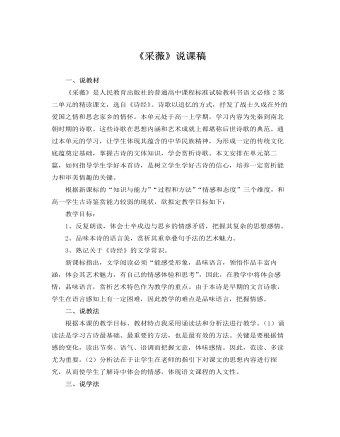
人教版高中语文必修2《采薇》说课稿
三、疏通课文,体会情感学生朗读一至三节,找出通假字,如“莫”;语助词如“止”“曰”;古今异义词如“启”“居”。以及个别短语如“靡室靡家”“载饥载渴”的结构,结合上《卫风·氓》中出现的相同或类似的结构来理解。检查学生的自学情况,抽查翻译,纠正错误。这三节都以采薇起笔,让学生思考课文呢写了薇菜生长的哪几种形态,有什么作用?学生思考。这个问题不难,但学生回答可能不完整,只点到用于表达士卒思归之情的强烈。老师要补充,用薇菜的生长来反映归期的推移和不定期,思念之情更加沉重。同时在艺术手法上,同《卫风·氓》用“桑叶”来起兴一样,这里也是比兴手法,引出下文。另外,战士们靠野菜来充饥也反映了战士们生活艰苦,兴中有赋。
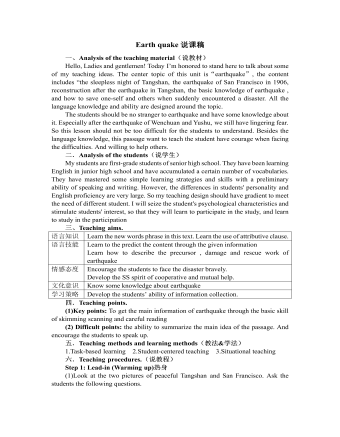
人教版高中英语必修1Earth quake说课稿
(4)Finally, I will ask the SS what this sentence mean:It is always calm before a storm.Purpose: attract the SS attention and bring them into discussionStep 2: Pre-reading 读前Here, I will do the second question in pre-reading first. I will use the method of brainstorming to ask the SS what will happen before an earthquake; and list the phenomenon on the table. 2. Then I will show the SS the picture of abnormal phenomenon, at the same time, encourage the SS to describe.3、finally, I will summarize these phenomenon4、Do the first question in the pre-reading , Imaging your home begins to shake and you must leave it right away. You have time to take only one thing. What will you take? Why?Purpose: help the SS to get further understanding of the topic and stimulate their interests.Step3: While-reading 阅读(1). Skimming Read the text quickly and catch the meaning of the first and second sentence of each paragraph. Predict the meaning of new words(2).scanning(找读)A. Read the text again. Do the following question.1. When and where were the strange things happening?2. What are they?3. Why did the text say the world seemed to be at an end?4. How was the city destroyed after the quake?5. When did the second quake hit the city? What was the result of that?6. Who came to help Tangshan first? And how?B. Work in pairs to discuss the question.
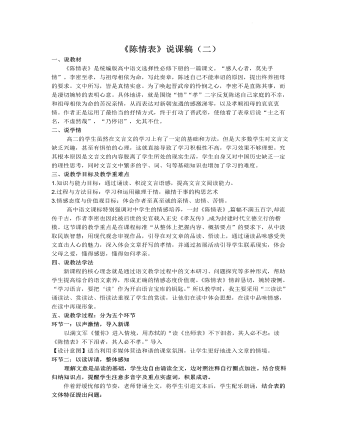
《陈情表》说课稿(二) 2021-2022学年统编版高中语文选择性必修下册
概括出祖母的形象:祖母是一位对我恩重如山,身缠重病,风烛残年的老人。(紧扣“婴”,)了解作者身世:“生孩六月,慈父见背;行年四岁,舅夺母志。祖母刘,悯臣孤弱,躬亲抚养。臣少多疾病,九岁不行,零丁孤苦,至于成立。既无伯叔,终鲜兄弟;门衰祚薄,晚有儿息。外无期功强近之亲,内无应门五尺之僮。茕茕孑立,形影相吊。”(概括明确:“孤苦”“孤弱”,突出“孤”)【先分析“应该尽忠”和“不得不去尽忠”,再分析“不能去尽忠”,避免了串讲课文的平淡与枯燥,使课堂有了波澜。】(三)追问探究,察理析忠孝问题:只说自身孤苦、祖母多病是“以情动人”,或许能打动一个君王,但是对于像晋武帝这样一个君王就很难说了。晋武帝究竟是一个什么样的君王?李密又是用什么理由说服他的呢?其间体现了作者怎样的机变和才智呢?
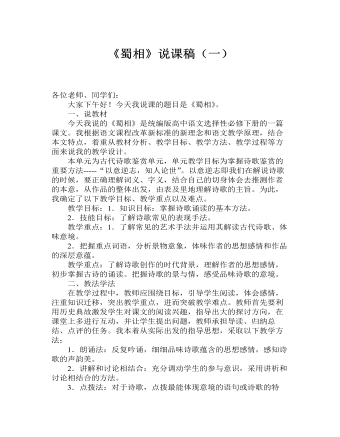
《蜀相》说课稿(一) 2021-2022学年统编版高中语文选择性必修下册
我将本节课分为三个部分:1.情境导入先运用多媒体,展示电影《赤壁》的几张图片,通过“赤壁之战”将三国时期这场经典战争诸葛亮的智谋呈现给学生,吸引学生走进历史,激发想象力和趣味性,提高学生的学习主动性。在成功吸引学生注意力过后,再向他们说,这只是历史中的一部分,在“赤壁之战”前后,诸葛亮一生的故事是怎样的呢?下面我们来看看唐代大诗人杜甫的《蜀相》,他是怎样用精辟的诗句概括的。2.讲授新课在成功吸引学生注意力后,迅速将他们带入课文讲授阶段。第一,进行作者介绍,其目的是为了使学生在整体上把握诗人的经历、写作技巧、艺术风格及写作背景。第二,多诵读,多推敲,理解诗中的言外之意。第三,把握重点词语,分析景物意象,体味作者的思想感情和作品的深层意蕴。感受诗人忧国忧民强烈的爱国主义感情。
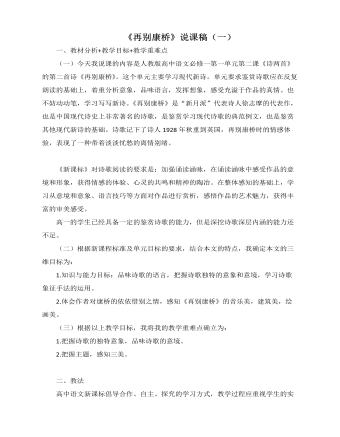
《再别康桥》说课稿(一) 2020-2021学年统编版高中语文选择性必修下册
2.对比联想法。让学生在诵读的基础上,对《再别康桥》中康桥美景的赏析和意象进行解读,引导学生欣赏诗歌的画面美,从而受到审美的体验。3.探究式学习法。引导学生对《再别康桥》情感和主题的探究。充分发挥学生自主学习的能力,引导学生主动地获取知识,重视学生的实践活动。三、学法1、诵读法 加强诵读,这是阅读诗词的一般方法。2、体悟法 通过意象把握情感,主要是让学生设身处地走进雨巷去感悟。3、联想比较法 通过与诗人的其他作品的比较学习,体会创作风格及作者情感。四、教学过程教学过程设计一、导入自古以来,离别总免不了沉重的愁绪。比如王维《宋元二使安西》:劝君更尽一杯酒,西出阳关无故人。李白《黄鹤楼送孟浩然之广陵》:孤帆远影碧空尽,唯见长江天际流。柳永《雨霖铃》执手相看泪眼,竟无语凝噎。正所谓自古多情伤离别,更那堪冷落清秋节啊。(设计目的:以离别主题的诗歌导入课文,让学生更快地进入课文情境。)
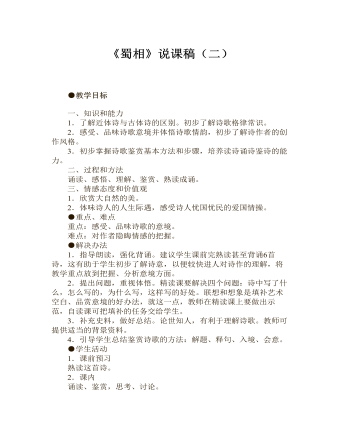
《蜀相》说课稿(二) 2021-2022学年统编版高中语文选择性必修下册
2.体味诗人的人生际遇,感受诗人忧国忧民的爱国情操。●重点、难点重点:感受、品味诗歌的意境。难点:对作者隐晦情感的把握。●解决办法1.指导朗读,强化背诵。建议学生课前完熟读甚至背诵6首诗,这有助于学生初步了解诗意,以便较快进人对诗作的理解,将教学重点放到把握、分析意境方面。2.提出问题,重视体悟。精读课要解决四个问题:诗中写了什么,怎么写的,为什么写,这样写的好处。联想和想象是填补艺术空白、品赏意境的好办法,就这一点,教师在精读课上要做出示范,自读课可把填补的任务交给学生。3.补充史料,做好总结。论世知人,有利于理解诗歌。教师可提供适当的背景资料。4.引导学生总结鉴赏诗歌的方法:解题、释句、入境、会意。
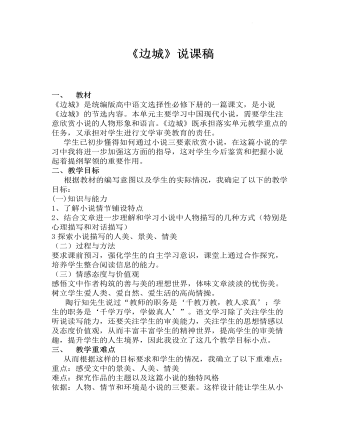
《边城》说课稿2021-2022学年统编版高中语文选择性必修下册
(重点突破一)1、分析环境描写 探讨边城的景美?(重点突破二)2、分析人物形象 探讨边城的人性美和人情美?至此,以三要素为切入口,文章的重点已分析完毕,下一个步骤就是突破难点。第二课时首先回顾上节课所讲的内容 (5分钟)(四)(难点突破)探究主题我设计了这样两个问题:1、小说表达了什么样的主题?(5分钟)2、有人说:《边城》从头到尾都隐藏着一种淡淡的愁绪,说说你的认识?从这篇小说中你可以看出沈从文先生的哪些显著的写作特点?(15分钟)这是两个定向设问的探究题,目的性很明确,就是为了突破难点,探究文章主旨。为了帮助学生理解文章的主旨,我用多媒体向学生 介绍《边城》的写作背景,给出“边城”的解题。对于第一个题,学生的答案可能会有很多种,比如“美”“爱”“纯”“和谐”“自然”等等,只要能基本概括,理由充足即可。
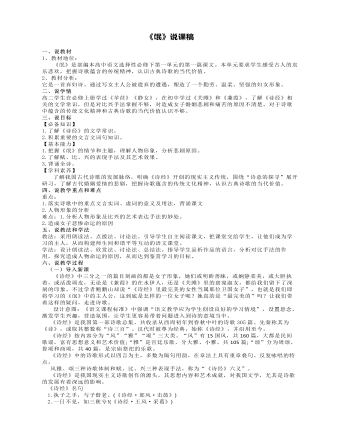
《氓》说课稿-2020-2021学年统编版高中语文选择性必修下册
“将子无怒”急于成婚,至于发怒,表现出急躁的性格特征;“二三其德”,又表现出他品德的败坏;“言既遂矣,至于暴矣”婚后的暴躁,婚前的热烈,婚后的离弃,两相对照,则揭示了他的虚伪自私。总之,氓是个性情狂暴、违背诺言、始爱终弃、不负责任、自私的负心汉。设计意图:用流行语概念引导学生去解读不同作品中的人物,培养学生比较分析的能力。3、探究《氓》中造成女子婚姻悲剧和痛苦的原因有哪些?个人原因:①氓的三心二意,不负责任。文中说“女也不爽,士贰其行”,女子怨恨的正是自己甘心贫困,辛苦操劳,多年如一日,但是最终还是被丈夫遗弃。②女子在经济上政治上处于附属地位。她生活天地狭小,生活的幸福与否全寄托在丈夫身上。如果遇上个对感情对家庭不负责任的丈夫,那她的悲剧是不可避免的。③性格悲剧。在男权社会中,女子在婚前行为草率,她与氓的恋爱缺乏牢固的思想基础,对氓的人品认识不足,认人不清导致的悲剧。社会的原因:
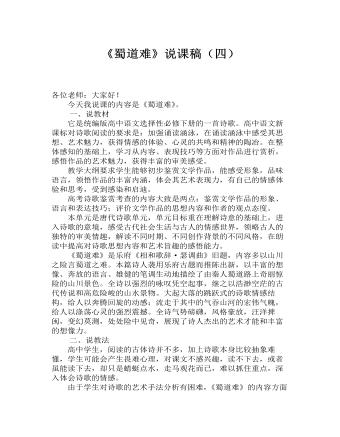
《蜀道难》说课稿(四) 2021-2022学年统编版高中语文选择性必修下册
再读(还是那两位学生)六、比较阅读(或者出一些诗句判断用的艺术手法)(依据理论联系实际教学原则)学的最终目的是用.我设计让学生判断诗句用的艺术手法的题型,使学生学以致用,而且还检验学生理解的程度,还测试教学效果。当发现学生对某个艺术手法掌握不好时,则及时地强化。李白与唐代的关系。指导阅读引申讨论(点出阅读的篇目《唐之韵》《走近李白》(不要)诗言志,诗往往抒发的是诗人的内心情感和自我追求,诗人的生平经历,丰富的生活经验和对生活的感悟都在诗歌中有反映。有句俗话“文如其人”。要了解诗作中的“我”为什么会这样哀怨,为什么会产生这样低调的情感。就必须了解诗人,才能更好地了解诗作,更深层次地理解诗歌形象背后的意蕴,把握好诗歌的基调。(为什么这样引导)

